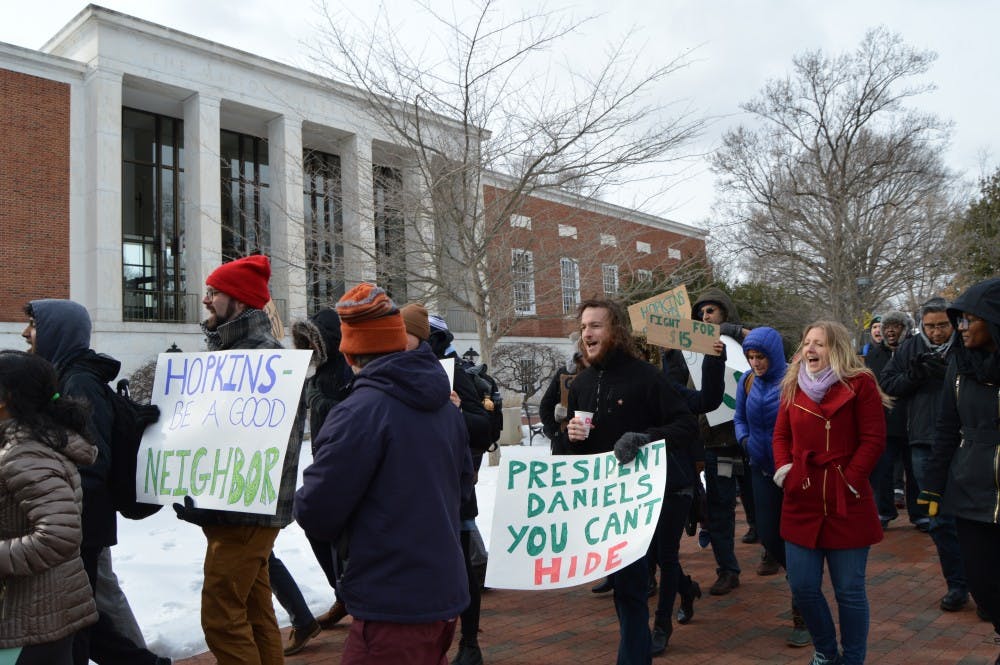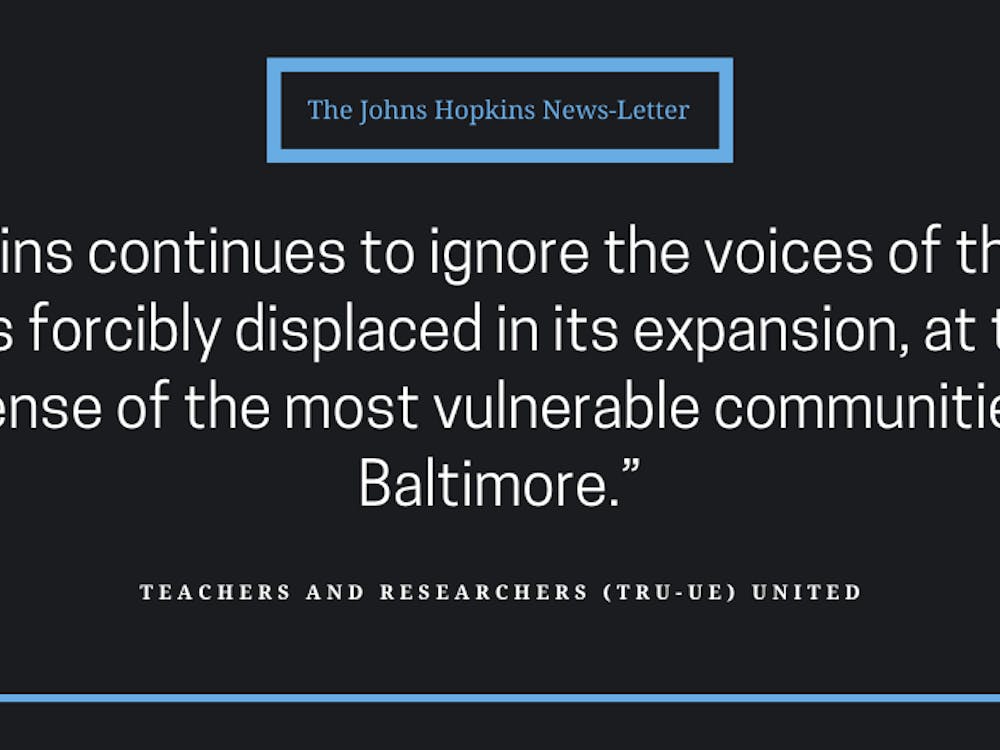Last year, the Student-Labor Action Coalition (SLAC) pressured the University to implement better job security, housing benefits and a $15 minimum wage for contract workers on campus.
Recently, several measures have been implemented to address SLAC’s demands. By 2019 dining workers will receive a $15 minimum wage. Additionally, a Baltimore City Council bill passed in June guarantees that contract workers will not lose their jobs if their employer is replaced by another contract company.
SLAC, a coalition that includes students, dining workers and security guards, has actively campaigned on behalf of contract workers at Hopkins, leading several protests over the course of the previous school year.
Since contract workers are not hired directly by the University, they do not have the same benefits as University employees. The two largest contract companies at Hopkins are Bon Appétit, a food service company that staffs dining facilities on campus, and Allied Universal, a company that provides security services.
Alberta Palmer is an organizer at Unite Here Local 7 (Local 7), a union representing the dining workers employed by Bon Appétit. She explained that the union originally asked Hopkins to institute the job security policy.
“We were asking Hopkins to pass a policy that says when the companies change, make sure the workers keep their jobs,” Palmer said. “Hopkins didn’t do it, so we pushed the City to do it, and actually we got them to make it a law.”
The bill, called the Displaced Service Workers Protection, would require an incoming contract company to retain current employees for at least a 90-day transition period. Mayor Catherine Pugh signed the bill into law on June 19.
First-year PhD student Corey Payne was formerly a member of Students for a Democratic Society (SDS), a student group and activist organization that works closely with the SLAC campaign.
He said that the University did not lobby against the bill as much as he expected, attributing this to SLAC’s efforts last year. However, he said that the University contacted the City Council to try to change the bill.
“My understanding is that Hopkins tried to get a waiver for smaller contract companies, so it would enact the law for big companies like Bon Appétit and Allied Universal, but for smaller contracts there wouldn’t be displaced worker protection,” he said.
In an email to The News-Letter, Director of Media Relations Tracey Reeves explained that before the Council’s bill, the University worked to make sure employees on campus could retain their positions when one contractor replaces another.
“The University did not oppose the ordinance providing job protection for contractor employees,” she wrote. “The University recognizes that, on our own campuses, these contractors’ employees are an important part of the campus community. They are known and very much appreciated by our students, faculty members and staff.”
According to Reeves, the University suggested changes to the language of the bill and wanted to ensure that it would not conflict with existing University policies.
“Contractors who employ staff on our campus may do pre-employment criminal background checks or drug testing, in accordance with legal requirements on their own policy,” she wrote. “We suggested changes in the legislative language to ensure there was no potential conflict between the new law and such pre-employment screening.”
Emeline Armitage, the current co-president of SDS, wrote in an email to The News-Letter that the administration often claims that Hopkins is unable to influence conditions for contract workers. She disputes this claim.
“The University’s lobbying for exemption in the job security bill is an example of their hypocrisy when it comes to their commitment to Baltimore,” she wrote. “The majority of Hopkins workers are black Baltimoreans, and Hopkins is the biggest [private] employer in Baltimore, yet Hopkins will not commit to improving the lives of their employees with a completely reasonable request for job security.”
Associate Professor of Sociology Joel Andreas said that the contracting system is disadvantageous to workers, because without job security, they have less power to negotiate their wages and other benefits.
He expanded on the University’s response to the legislation on job security.
“What I understand is that the University was very much opposed to that law but that they tempered their opposition because it would be bad publicity,” he said. “The students have been so active in pushing this thing, and that was one of the workers’ demands.”
Andreas added that the University had previously opposed the campaign to raise Baltimore’s minimum wage to $15 per hour. Last spring, Mayor Catherine Pugh vetoed a $15 minimum wage bill, even though she supported the measure during her mayoral campaign.
Payne said that SLAC will still pressure the University to raise the minimum wage to $15 for all contract workers.
Recently, Local 7 negotiated a plan to raise Bon Appétit workers’ wages to $15 by 2019. Though Payne said that Hopkins was not involved in this negotiation, Palmer said that the union considered the measure a victory and attributed the success to pressure SLAC placed on the University.
“We were able to push Hopkins enough through the protests and the rallies and the demonstrations,” she said. “In the next two years, every person walking in the door will be at $15. For now they’re getting about $14.40, next year it will be about $14.80, and so the following year, which will be 2019, they’ll be at $15.”
According to Armitage, SDS will continue to keep the administration accountable for their promises to workers, like the new measure to raise the minimum wage in the next two years.
“We are excited to hear the University agreed to a negotiation between Local 7 and Bon Appétit,” she wrote. “However, we must also look back to past negotiations with the University, such as the livable wage campaign in the early 2000s and remember that it is crucial that this isn’t just a one-off deal for the University. The University must understand that $15 is not just a number but a promise to treat employees more fairly.”
Andreas said that a $15 minimum wage is reasonable for workers.
“You can’t live on less money than that, so they can’t expect people to live and raise families,” he said.
Payne said that SLAC worked with students and members of Local 7 to compile a survey for contract workers at Hopkins. The survey revealed that many of these workers cannot support themselves on their current income levels.
“15.8 percent of the people we interviewed did not have enough money to make ends meet at the end of most months, and another 42-44 percent indicated that they had just enough to make ends meet,” Payne said.
SLAC has campaigned for the University to institute a program like Live Near Your Work for contract workers. Live Near Your Work grants loans for Hopkins staff to purchase homes near campus. Payne said that too many contract workers are struggling with low wages and fear for their housing or their jobs.
Palmer emphasized that the University has enormous influence that can affect its workers.
“It’s a human rights issue,” she said. “It’s a Baltimore citizens, a Baltimore workers issue. So Hopkins definitely should weigh in on it.”
She also said that Hopkins students can effectively pressure the University to make changes.
“The union is forever grateful and almost indebted to the students for joining us in these fights,” Palmer said. “Without them we would not get this far, because everybody knows that the students are where Hopkins gets its money from. Their time spent with us made a huge difference in the lives of at least 200 workers.”
Emeline Armitage, the co-president of SDS, regularly contributes to the Opinions section of The News-Letter.























Please note All comments are eligible for publication in The News-Letter.